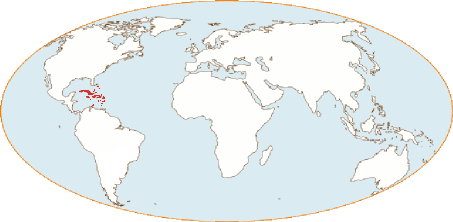Your search results [16 articles]
Origin and domestication of the Sweet Potato.
The sweet potato (Ipomoea batatas) is a member of the Convolvulaceae family. Its geographical origin includes Central America and the northern fringe of South America (from Colombia to the Amazon delta). This vast area coincides with the largest number of species and varieties recorded, no less than 500. The relative geographical imprecision is explained by the absence of wild specimens found to date. It prevents paleo-botanists from locating in time and space the transition to the domestic varieties of sweet potato.
To complicate the picture, its oldest traces, dating back to 2000 BC, were discovered outside its supposed region of origin (Ventanilla site, Chilon coastal valley in Peru) where they are found next to potato and achira remains. The sweet potato should not be confused with the potato (Solanum tuberosum of the Solanaceae family) domesticated on the highlands of the Andes Cordillera (Lake Titicaca) 4500 years ago.
For sweet potatoes, the phase of human appropriation seems to last a long time, until their true domestication. The development of tropical agriculture in humid forest areas (Amazonian lowlands, Guianas) goes back 4500 years. The first Amerindian agricultural complexes (villages set up along the rivers, fishing, horticulture of food plants and tubers, except for manioc) were based on sweet potatoes and yams.
A second agricultural and cultural complex spreads cassava, pottery and cultivation on raised wet fields. It competes with the first one (better starch productivity of cassava) and is superimposed on it by enriching the range of food tubers[1]. The cassava species did not make sweet potatoes or yams disappear. Their adoption and diffusion specialises the technical and social use of each tuber family. Cassava beers can be found in the same areas next to sweet potato beers.
The domestication of tubers in two waves (a hypothesis studied by specialists) would result in two historical stages for the Amerindian brewery of the peoples inhabiting the tropical lowlands. The sweet potato beers would be older (around -2000?), at least in Amazonia and the Guianas. The cassava beers would have appeared later with the expansion of cultural complexes propagating cassava and pottery. This would explain why the sweet potato remained an ingredient in the brewing of cassava beers and why sweet potato beers still have a much wider spectrum of social uses than cassava beers among the Amerindian peoples in the 16th century.
The sweet potato was introduced to Oceania around 1500 BC. It is said to have crossed the Pacific westwards, using South American and then Polynesian boats, or travelling with migratory birds to gradually reach all the islands of the Pacific. We will study elsewhere its use to brew beer among the peoples of the Pacific.
The sweet potato plays a central role in the Amerindian cultures of Central and South America (northwest). It is a food, the source of simple decoctions, of fermented beverages, a medicine, the drink of certain specific offerings to the spirits. The arrival of the Spaniards did not fundamentally change this geographical distribution. The potato crop remains confined to the Peruvian and Chilean Indian lands, the cultivation of sweet potatoes cohabits with that of manioc everywhere else.
These three food treasures, domesticated, cultivated, improved and honoured by the Amerindian peoples for thousands of years, were plundered, like maize, from the 16th century by the Spanish and Portuguese to make their African, Asian and North American colonies prosper. Before contributing to the food balance of European nations. To thank them for these invaluable gifts, the same plunderers and the European royal courts that financed their expeditions decided their genocides.
[1] O'Brien Patricia 1972, The Sweet Potato: Its Origin and Dispersal, American Anthropologist 74-3, 343-344.



